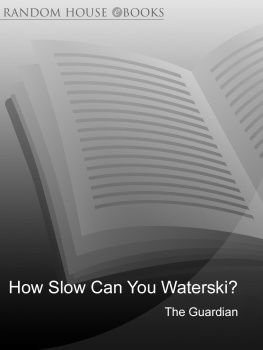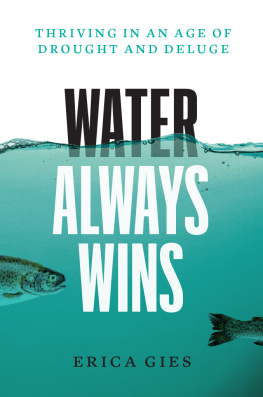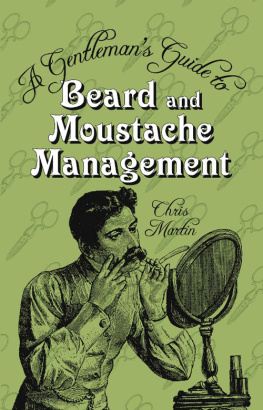All the articles here were written by the Guardians science team Tim Radford, Ian Sample, David Adam, Alok Jha and James Randerson with guest appearances by other Guardian and science writers, particularly Kate Ravilious, Ben Goldacre, Sarah Boseley, Steven Morris, Lucy Rogers, Bill Hanage and Laura Bach.
How Slow Can You Waterski?
Edited by Simon Rogers

Minds & Bodies
Do books improve your mind?
WE ALL LEARN to read, but what happens in adult life when we fail to keep it up? Does the brain shrink like a withered prune? Studies in America found that continued intellectual activity between the ages of 20 and 60 may protect against dementia in later life. One found that continuing intellectual pursuits reduced the risk of Alzheimers disease by a third. In another study, relatively inactive patients were 250% more likely to develop Alzheimers.
Damaged brains can adapt and learn. Researchers who have used brain scanners have found that other parts of the brain can compensate. But exercising the brain, in much the same way as one would exercise a damaged muscle, perhaps by repeating a list of items, does not help regrowth.
Are you going to benefit more by reading Shakespeare than Vogue? It probably doesnt matter as long as the brain is exposed to new information that stimulates your cells. Luckily, physical activity also counts. Whether physical exercise is as beneficial as intellectual activity remains unknown.
Do animals make you feel better?
The idea might sound like new age mumbo-jumbo. But scientists now believe that swimming with dolphins really does alleviate depression.
It supports a theory put forward by the sociobiologist Edward O. Wilson. According to his idea of biophilia, human health and well-being are dependent on our relationships with the natural environment. This means that animals and natural scenery help us feel better, and our happiness around nature is somehow hard-wired into the brain. A growing body of clinical evidence suggests that Professor Wilson might have a point. In a paper published in the American Journal of Preventive Medicine in 2001, public health scientist Howard Frumkin of Emory University, Atlanta, reviewed the evidence for the health benefits of four kinds of contact with the natural environment: contact with animals, plants and wilderness and viewing landscapes.
He pointed to research which concluded pet owners have fewer health problems than non-pet owners. They had, for example, lower blood pressure, improved survival after heart attacks and better ability to cope with life stresses. At Purdue University in Indiana, patients waiting for dental surgery were found to experience a clinically significant drop in blood pressure after staring at fish in an aquarium for 20 minutes. In another study, University of Washington scientists found that children with autism who were allowed to play with dogs became more verbal and engaged with therapists.
In Japan, researchers compared the responses of people who looked at a hedge with those staring at a concrete fence. The former experience caused relaxation, while the latter produced stress. Similar responses occurred when subjects looked at a vase filled with flowers as opposed to an empty pot.
Why any of this should happen is largely unknown but Professor Frumkin had some ideas. Early humans found that places with open views offered better opportunities to find food and avoid predators, he said. But they needed water to survive and attract prey, and groups of trees for protection. Modern research has shown that people today, given the choice, prefer landscapes that look like this scenario.
Can you die from heartbreak?
With the caveat that it is difficult to establish a link between emotional stress and physiological health, all the evidence suggests that the answer is yes.
The first study to look at the issue was published in the British Medical Journal in 1969. Researchers followed 4,500 widowers, all 55 years or older, for nine years and found that the risk of dying in the first six months after bereavement was 40% higher than expected, then it gradually fell back to normal.
A bigger study, published in 1996, confirmed these results. Scientists looked at more than 1.5 million people aged between 35 and 84, and found that, in the six months after losing a spouse, the risk of dying from a heart attack increased by 20 to 35%. They also found that the risk of dying from an accident, violence or from alcohol-related problems nearly doubled. And in most cases, the risk of death was greater for men.
Why bereavement might trigger death or illness is largely unknown, but speculations are rife. When people lose the lifetime support offered by a partner, they are more likely to get stressed. This might have acute effects on the body and, the more elderly the person, the more pronounced those effects may be.
People suffering from stress due to losing a loved one have reported a range of health problems from gastro-intestinal complaints to muscular pains. The sudden stress could also trigger more serious underlying problems, such as heart disease.
How psychological pain turns into a physical problem is also an active area of research. The accepted wisdom is that the brain, after registering the psychological and social variables around it, will signal instructions to release certain hormones into the bloodstream and these affect mood as well as subsequent health.
Psychologists have found, for example, that people going through a rough patch in their relationship were more likely to catch a cold or flu. In a study of 2,000 people in various emotional states at the Medical Research Councils social and public health sciences unit in Glasgow, researchers found that stress or bereavement was linked to a decrease in the levels of an antibody called immunoglobulin A, which is the bodys first defence against foreign microbes.
Why this happens is unknown, but researchers believe it might be down to high levels of the hormone cortisol, which tends to increase during stressful situations.
Does having wonky elbows matter?
That depends. Are you a man? Do you have a wife or girlfriend? And, most importantly, are your ears and fingers as mismatched as your arms?
If the answers to all of the above are yes then your (unbalanced) ears will have pricked up at the news that your partner is most likely to be unfaithful. A study of 54 couples by the University of New Mexico found that women whose partners have mismatching ears, fingers or elbows tend to fantasise about sex with other men when they are ovulating. Those whose men happen to be neatly proportioned do not, and still prefer their partners to other men, even in the middle of their monthly cycle.
Studies of sexual desire are not new. Dave Perrett at St Andrews University suggests that women prefer symmetrical faces because this indicates healthy genes in their partner.
Sex hormones are linked to feminine and masculine facial features youth and fertility signalling good long-term health. By exaggerating such facial features, researchers have found that women are attracted to strong masculine faces but too masculine a face can be a turn-off, indicating a cold and dishonest mate.
Can you stop yourself sweating?
If horses sweat, men perspire and ladies glow, then all three have their autonomous nervous system to thank. That means that sweating (or perspiring or glowing) is a reflex action and independent of direct messages from the brain. Some people have a more responsive nervous system than others, so while some are cool under pressure, others may find embarrassing stains on their shirts. And alcohol can effectively reset the nervous system to produce yet more sweat.











